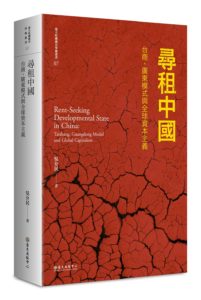
Jieh-min Wu 吳介民
NTU & HYI Academic Book Series No. 7
National Taiwan University Press, March 2019
About the book: This book proposes a comprehensive explanation of the connections between China and global capitalism. It was Taiwanese businessmen who, as intermediaries, made it possible for the Chinese to earn their first pot of gold in Guangdong province, indirectly bringing about the Chinese boom. The author uses global value chains as a springboard to explain how the “rent-seeking developmental state” has played a crucial role in the processes of economic development and value capture. This explanation links the global level to the local, the macro perspective to the micro, and dissects the intricate relationship between government and business in China. Concepts such as “institutional rent-seeking”, “locally embedded governance”, and “differential citizenship” are proposed as ways to shed new light on the developmental logic of China’s economy. The secret to China’s economic success has been “following global value chains to become the workshop of the world”, but in trying to upgrade itself the world’s workshop is facing serious difficulties. Where has China’s economy come from, and where is it headed? This book offers us a key.
About the NTU & HYI Academic Series: The book series, published by National Taiwan University Press, is a collaboration between the Harvard-Yenching Institute and the College of Liberal Arts of National Taiwan University. The Series publishes scholarly monographs in Chinese which make a major original contribution to the humanities and social sciences. Interdisciplinary studies are especially welcome. Submissions are encouraged from all Chinese-speaking regions and beyond. For more information about the NTU-HYI series, please visit the NTU Press website.
